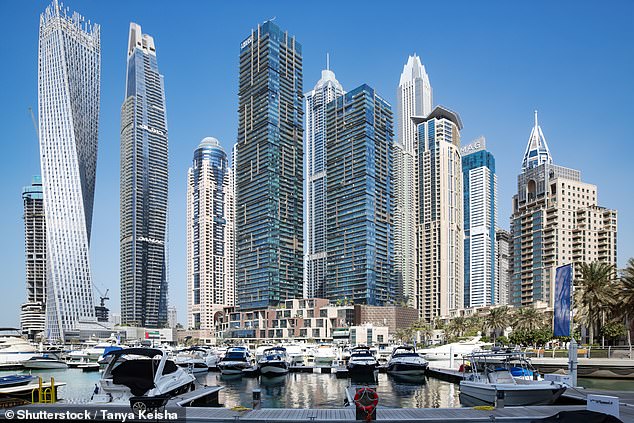[ad_1]
Taking photos on holiday captures the most memorable highlights of a trip, but a picture-perfect snap in the wrong place could land holidaymakers in serious trouble.
Luxury travel specialists at eShores are warning tourists of the seemingly innocent photographs that can break local privacy laws and breach copyright restrictions in destinations around the world.
Some locations have specific selfie bans, and taking photos of others without consent or posting about your travels online could result in fines of up to £110,000 – and even prison time.
With the average Brit snapping around 14 selfies a day during their travels, Gavin Lapidus, founder of eShores, stressed the importance of understanding local laws and cultural sensitivities while holidaying abroad.
He advised: ‘We always recommend travellers research photography restrictions before they travel, or better yet, speak to experienced travel consultants who understand each destination’s cultural nuances and legal requirements.’
Seasoned travel consultants warned tourists to be especially vigilant taking photographs in or near; religious sites, government buildings, cultural institutions, military zones, copyright-protected landmarks and public spaces with privacy laws.
Here’s a closer look at five of the most expensive photo opportunities across the globe, and why you should think twice before you click.
Dubai (UAE) – Potential fine: £110,000

In Dubai, it’s crucial to be mindful of privacy and avoid taking photos of people without their consent, as this is a violation of UAE privacy laws

Taking photos on holiday captures the most memorable highlights of a trip, but a picture-perfect snap in the wrong place could land holidaymakers in serious trouble
In Dubai, taking photographs is generally fine for personal use, especially at popular tourist spots.
However, it’s crucial to be mindful of privacy and avoid taking photos of people without their consent, as this is a violation of UAE privacy laws.
Tourists can face eye-watering fines of up to 500,000 AED (£110,000) or even imprisonment.
Cameras are also strictly banned in government buildings, military sites, specific palaces, and designated areas throughout the emirate, so that Instagram selfie could literally cost you your holiday – or your freedom.
Spain – Potential fine: £26,400

In Spain, taking a selfie with, of, or including police officers in public can trigger brutal fines ranging from €600 to €30,000 (£530–£26,400). (Pictured: Los Christianos Beach, Canary Islands)
In Spain, taking a selfie with, of, or including police officers in public can trigger brutal fines ranging from €600 to €30,000 (£530–£26,400).
The controversial 2015 ‘Gag Law’, which was initially introduced to restrict photographing or filming police, has since been relaxed, and now prohibits unauthorised use of images that could jeopardise officers’ safety or hinder their work
The law, however, is actively enforced, especially during protests and in sensitive locations like airports, turning tourists into unwitting lawbreakers.
Japan – Potential fine: £55

In historic geisha districts, such as Kyoto’s world-famous Gion quarter, there are bans on photography in some areas due to issues of tourists harassing geisha (Pictured: Byodo-in Temple in Kyoto)
In Japan, photo restrictions go far beyond the obvious temple no-nos, with strict no-camera policies also enforced at train stations and traditional ryokan inns.
In historic geisha districts, such as Kyoto’s world-famous Gion quarter, there are bans on photography in some areas due to issues of tourists harassing geisha.
Taking an unsolicited selfie with a geisha, or even just taking photos of them in certain areas, can lead to fines of ¥10,000 (around £70) – not to mention serious cultural offence.
Portofino, Italy – Potential fine: £242

In Portofino, Italy, lingering for too long while snapping a selfie in ‘no-waiting zones’ could lead to a fine of up to €275
In Portofino, Italy, lingering for too long while snapping a selfie in ‘no-waiting zones’ could lead to a fine of up to €275 (£242).
The picture-postcard town has implemented these restrictions to manage overcrowding and pedestrian traffic jams, especially during busy periods of the tourist season.
South Korea – Potential jail time

In South Korea, privacy is taken seriously with its ‘Right to Face’ law, which grants members of the public comprehensive image protection (Pictured: Myeong-Dong district, Seoul)
In South Korea, privacy is taken seriously with its ‘Right to Face’ law, which grants members of the public comprehensive image protection.
This means taking photos of individuals without their consent, whether in private spaces or even in the street, can lead to legal issues such as potential jail time if subjects are identifiable.
While not widely enforced, unregistered selfie sticks can also technically lead to fines.
[ad_2]
This article was originally published by a www.dailymail.co.uk . Read the Original article here. .

